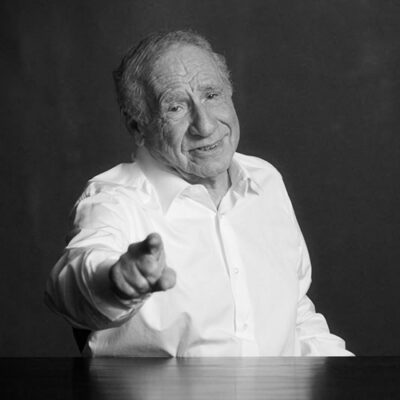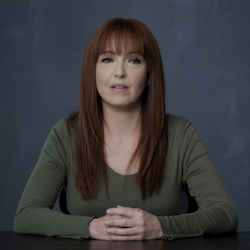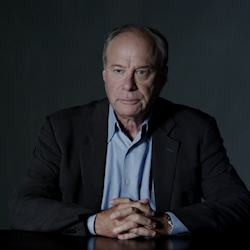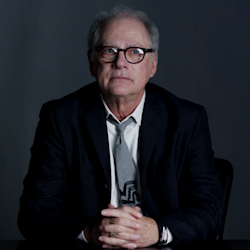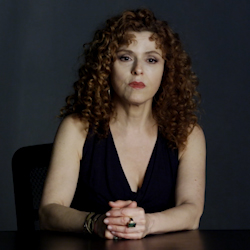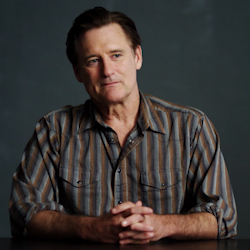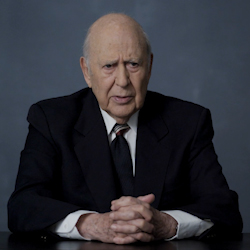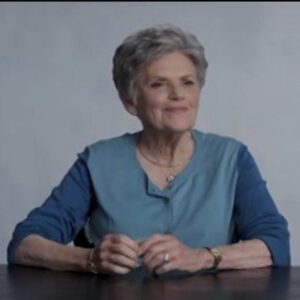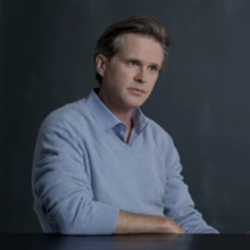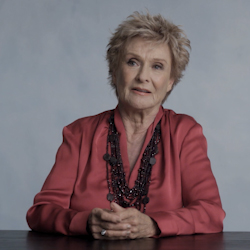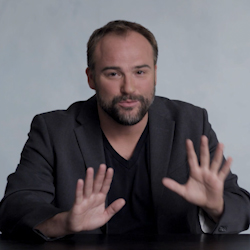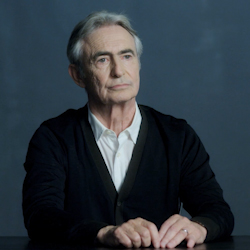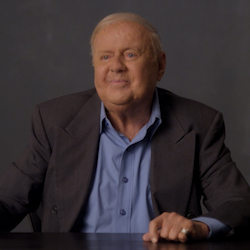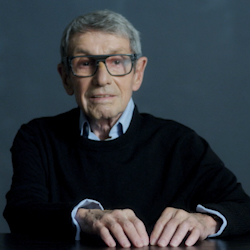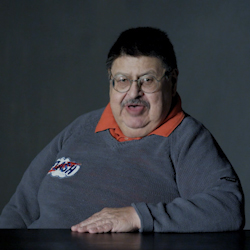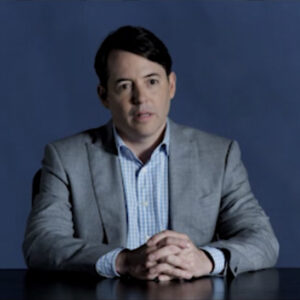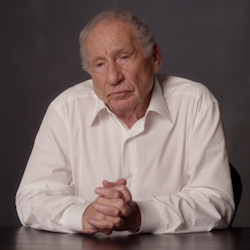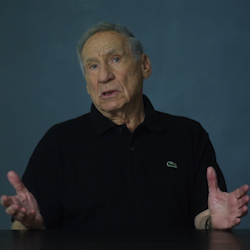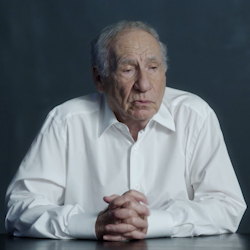Interviewer: Hello.
Alan Johnson: Hello.
Interviewer: How did you, tell u how you first came to work with Mel.
Alan Johnson: I met him socially first. He was working with a friend of mine on creating a sitcom for about two divorced husbands. And. And he used to come to my friend’s house and work with him. And then we will we will a company of West Side Story dances. And so we were all always at their house. Then after they’d finished working where you’d have coffee and cake. So I got to know him socially. And to know him socially is to know him professionally. I mean, he loves an audience. He plays to anybody in the room. And so we got to know a lot about him. I was aware of his work with the Sid Caesar shows. 2000 year old man. That kind of thing. But he had just written a script called Springtime for Hitler. And he was telling he’d do it for us in their living room. And but they couldn’t get anybody to back them. They hated the title. Nobody would touch it. So there were months of looking for a new title. And finally they settled on the producers and it got picked up and. So that’s how I met him socially. And what happened in the course of social events, he’s told me all about it. Told me the number, he told me at what he liked, what he said. And he said, because I was beginning a career in choreography. He said to me, Who do you think would be right to do that? And I said, Ron Field. And he came in to Dr. a Broadway show. And Ron Field was the choreographer. And he thought it was terrific. He said, That’s it. I’m going with him. I said, terrific. It was a proscenium. No, it didn’t have a lot to do with the book. And. So he said, look at this, this is like a month later said, look, there’s a problem with Ron schedule or money or something. I’m going to ask you to do it. And I said, Mel, it’s your first film. You want to get the best you can. He said, no, we’ve talked enough that I know how you feel about it. And so if there’s a problem with Ron, I’m going to ask you to do it now a month later. He asked me to do it. And I said, jeez, this is terrific. Doing a film with Mel Brooks. And it wasn’t long because it was a long wait between springtime for Hitler and the producers. So everything was sort of locked in in place, you know. So John Morris, who scored a lot of his films and was a dance dance arranger, we got in the studio with Mel. The three of us surround a piano and just threw everything out and tried to make it what it was going to be. Mel had some strange ideas. I mean, we said, Mel, you can’t do that. But it pulled down to being the. Movie that he wanted. So. That was it.
Interviewer: Can you tell us some basic. Sort of incorporate them into the stories and basic facts like it was you shop the number in a very small theater to shut. All in one day. Couple of campers, chorus girl wear a swastika.
Alan Johnson: Yes. How’d you know that?
Interviewer: Yeah, I did my homework. Can you tell us about.
Alan Johnson: Yeah, that one chorus girl. She had swastikas on her boobs.
Interviewer: She started out as there was a cause.
Alan Johnson: There was one chorus girl who had swastikas on her boobies and. She was Jewish and she was offended and she thought her friends would be offended. So cut the boobies. Cut the swastikas. And. But you know what was incredible, we walked in this theater, I forget what it’s called. It was on West Forty eight Street on the east side of Broadway. And the fun for me was, you know, those three sheets posters OUTFRONT. They were designed by the designer of the movie. And they were they had my name, John Morris’s name. And as though we were characters with, you know, it was fun. I have one at home that Mel gave me. And it says, Love, Mel. But it’s the one from outside the theater which was in the movie.
Interviewer: So can you stay the. Go ahead.
Alan Johnson: You know, because there were more than just the number. The audience reaction shots. I think it was more than one day, but probably the number was shot in one day coverage. The overhead that may have taken one day, although it seems like it would have taken more. But all the extraneous shots in the theater at that location. I don’t know. I’m going to say three days. Which is fast.
Interviewer: And how long did you have? Did you have enough time? I mean, was it a rushed rehearsal period? Were you dancers?
Alan Johnson: No, it didn’t seem rushed because I knew what I was gonna do. I mean, having laid out the music with John Norris and the dance hiring dancers that I knew could pick it up in a second. And I feel like I covered my butt.
Interviewer: I think it was hard to find showgirls or.
Alan Johnson: It was. It was. I don’t know why, but it was difficult to find showgirls. I mean, they they certainly weren’t dancers. There were models for the most part and pretty. And one was a classic. Showgirls of the period. She looked like a little old to me. But we used her anyway.
Interviewer: So basically was Mel sort if. Watching over to see or you just don’t know.
Alan Johnson: He was busy lining up carrying cameras. You know, when I say I’m going to do a film with Mel Brooks. Everybody goes, Oh, my car. That’s going to be selfish. You’re going to have such a good time. Mel, when he’s shooting at film. It’s much more intense than that, sometimes gets a lot tense. Especially if he’s acting that movie. But no, he was busy. He’s on the set checking everything.
Interviewer: Did the dancers, were the dancers just aware of the absurdity of that number, I mean, in terms of..
Alan Johnson: Sure, dancers are hip.
Interviewer: It’s just that it’s still to this day just unbelievable to watch how they get the straight face doing. It was a.
Alan Johnson: Rehearsal. You know, you stop laughing after the 14th time.
Alan Johnson: It’s true.
Alan Johnson: And what do you choreograph in concert? Blazing Saddles.
Alan Johnson: Yeah.
Interviewer: What you remember about working with.
Interviewer: Loving Her. Right. She was just the best thing that Broadway ever saw or the movie. Shoot. Wait. She called me when we were both in New York before going out to do that. And her boyfriend? No. I think it was Carol Bayer, Sager’s boyfriend was a friend of hers and he was connect with Bill and he ran it my late night Dietrick movies, and she called me up and said, You want to come see? We’ll go look. And. She picked that up right away. I mean, she was perfect.
Interviewer: It’s really was the the. The Inquisition, it’s a. It’s on par with any other stats. I don’t know. No. A lot of a lot of a lot of mystery shopping at the box. All right.
Alan Johnson: I’m not sure I know where we were. Warner Brothers. Because of the poor shot of him. Yeah. Probably because the poor. But the shot of Harvey running out of the studio and then the pan up to that tower.
Interviewer: All right. No doubt about that history of the world is you do need position.
Alan Johnson: Oh, yeah, yeah, yeah. Sorry, I went somewhere else.
Interviewer: Is it something you worked out with Mel in terms of the slot machines with the guys tied to it, or is it ideas that you brought? He said so much of that was going to go on until it melts.
Alan Johnson: Mel brings a multitude of things and then it gets formed into a musical number. The thing I brought was the three Jews on the slot machine.
Interviewer: As I said, the same.
Alan Johnson: Thing I brought to it was the three Jews on the slot machine and all the money comes out.
Interviewer: And obviously it made Mel laugh.
Alan Johnson: Yeah.
Interviewer: So really huge production.
Alan Johnson: Well, it’s what I love. It’s what Mel loves, you know. Mel. Mel. It’s a song and dance man. He started is it to Miller. To the Catskills. And he he sings, he loves to sing like Frank. He likes to dance like Fred Astaire. It’s his period. My period also.
Interviewer: Any particular memories, anecdotes from any show?
Alan Johnson: No, not really. I was looking at the posters in my house and I was trying to think it all sort of meshes together. However, there were things that are stuck in my memory. I keep thinking that period is going to the University of Mel Brooks for comedy. And because I was around so much, I’d like to hear him say things that stuck in my not my mind. Like, you know, you have the crew coming up and saying, well, what do you want to do? What should we do? How do you want that? And, you know, the crew is 400 people. So you’ve got all those questions. I remember him exploding at one point and going, give me a yellow wall and two actors. It’s a comedy.
Interviewer: He didn’t need to force it out.
Alan Johnson: Yeah. Yeah.
Interviewer: The, uh. Well, did you come to direct. To be or not to be.
Alan Johnson: Mel said to me at one point, I was in the office all the time. Doing something or not. And simply being is bound. The thing he bounces off and he said to me, Look. Very strange for him. I’m going to write this film and I’d like you to be on it from the writing, through the editing, and maybe you’ll learn how to make a movie. And so that’s what happened. And, of course, what studio would hire a beginner like me? But Mel said told reassured the studio that he would be on the set every day. And so they took me. And that’s how it happened. He made it happen.
Interviewer: And how was that experience?
Alan Johnson: I love Ann, Ann it’s terrific. Mel, again, was playing a role. So he was very intense. He would. Oh, I know. Annie he was filming and she was very supportive of him. She would be on the set a lot. And so we were doing a little scene with Mel. and she was sitting next to me and they said, take 19. And she went, how come I only get two? And. But Mel was that way. It’s committed to film. It’s there for ever. So he wants it. He wants to be his best. He wants. He thinks he can do better every time. And the irony is that when we were editing, it was you take one or take two from Mel, you know, but he’d he’d go on forever because I could always do it better. He’d.
Interviewer: Was he pretty good about giving up stuff, things that weren’t working?
Alan Johnson: No. He was good by that point. Enough when we were filming, everything was sort of locked in knowing it was going to work. There is one instance where we were editing and he was displeased with one of the performances and he. What he did. Goes back to its drummer and timing. What he did was cut them at the scene. I did not cut it out. TriMet it, and then he’d go back to the visual and smooth that over. But what he did was improve the performance by the actor. He was he’s very good about timing.
Interviewer: How did you when your directing, how does he suppressing his urge to direct you?
Alan Johnson: So who says he did? You know, he jumps in. He’s in it. It’s his film. And he jumps in and does what he can.
Interviewer: I don’t mind.
Alan Johnson: I was in on a pass, I’d never be there without him.
Interviewer: Would you say that there’s really no one comparable to him or his career?
Alan Johnson: No. No. Well, I mean, you could say Woody has had a career, but nobody like Mel. He’s daring. And he has tremendous energy.
Interviewer: Always a plane.
Interviewer: The shuttle coming back.
Interviewer: So pick it up from “he’s daring, he has tremendous energy.”.
Alan Johnson: He’s very daring. That’s self-evident. And he has tremendous energy. He has a perforers energy. Not a. Cinematic energy, a performer. His comedy is. Bigger than life. It’s more absurd than actual life. He takes it to the limit.
Interviewer: I say that’s a very good job.
Alan Johnson: Yeah, he was. He was always on the set. And if he could help in any way, if you had a note advice, he’d be there. He’d jump in. Except he was playing Hitler. He was in a Hitler costume and he was having trouble with the bridge. I was giving him such pain. And a couple of days he had to leave the set and go to the doctor dentist. And I kept pondering because he he was there and it’s Hitler outfit. If he walked into the dentist office as Hitler, you know, that would have. Gotten a few takes on the air.
Interviewer: So where were you when you say, I want to put three Jews on a slot machine and have money pour out. I’m assuming it doesn’t even phase him. Okay, great.
Alan Johnson: Yeah. Yeah. I mean, that’s what he does. You know, he like I was telling you, why were you putting the ideas together for Springtime for Hitler? There was something he came up with. Where were you. Whoa. You know, so I mean. Hill hill. Good. Well, what about Ronnie Graham and Jackie Mason? There, two snatches of song. I mean, that’s audacious.
Interviewer: Yes. Is there any is there any time that you can remember? Well, this is sort of one of them where you just said. No. No. I mean, that’s. And he comes around here.
Alan Johnson: Yeah, yeah, yeah, yeah. I mean, he can be outnumbered. Johnny and I. Johnny Morris just waiting, saying, no, you can’t do that. We just went, whoa.
Interviewer: It is bit that big. It will get. That’s still high.
Alan Johnson: What do you see? What is that?
Interviewer: Well, it’s the camera. Here we go by Alan Johnson. Take two. OK. Sounds good. OK. So you were saying you should start off like you were saying that you and John Laws? No.
Alan Johnson: Yeah.
Interviewer: And say John’s name.
Alan Johnson: John Morris and I would be around the piano with Mel. Mel would come out with some. Strange ideas. And we just sort of gasp and say, well, do you think that oh. I mean, we didn’t say no, you can’t do that all about. That’s what we felt. But and if Mel persisted and the two of us persisted on the other side, it eventually would slip off the table. You know, a little off the subject, but. Melon and I were trying to get pregnant for a long time and. She was in England doing young Winston, I think. And. The friend that I mentioned by working with Mel on the idea of two divorced husbands. They took a villa in the south of France. And so Mel went over to England and picked her up and then the two of them came to the villa. And I was there with a friend of mine, Larry Kurt, and it was glorious, but. One afternoon, Larry Kert was doing a flip off the side at the pool and and became intrigued. How did you. What would you stop? She wanted to know. So he talked her through it and she did one. And she was joyous, joyous. And so they did back flips that afternoon. Then we had lunch and then it was nappy time. So the other two friends who had taken the bill up with my other two friends, they had a small boy named Bobby Young Petzold, little thing. And. So everybody was in their rooms in the afternoon and. Bobby. Left his mother and father’s bedroom and walked the halls and opened the door on Melen nanny, who were. In an embarrassing position. So Bobby, going back to his bedroom, told his mother and father. I think I fell. God and. Anyhow, everybody said that’s when the conception happened. And I said, no, I think it was. The back flips off the pool that jiggled all the female female things. And. But then they came. Max. His son.
Interviewer: You also said this great thing, which you shouldn’t be first, which is. The number three person, the way that I did, I say that, yeah.
Alan Johnson: Somebody else must.
Interviewer: So yeah. Yeah.
Alan Johnson: Oh really? Have we met? Yeah. Yeah it’s true. It again, rhythm, the rhythm of the film. You you start to establish you have fun. You go ahead and you need an explosion just before the ending. So that you pick everybody up there ready to go for it. And what you’ll see it if you look at his films, there usually is a number somewhere, three quarters of the way through.
Interviewer: So once I get out of fear, I think it’s a good lover.
Alan Johnson: Yes. Yes, exactly.
Interviewer: We love the film. Sort of became the upper.
Alan Johnson: Yeah. He’s a theater baby, even, you know, even if he didn’t do a lot of Broadway. He could be a composer. He could be a director. He could be a dancer. He could be anything. You know, another personal thing about Mel and Andy, my two friends that I keep mentioning. They had a baby daughter. The baby daughter had some physical problems, like we’d all be there playing cards or whatever. And in the middle of the night, she would wake up and and I’d hear her cry. And then we’d go and get her. She had fevers. So she always had to be thrown into a cold tub. But when she’d cry, Mel and Annie, we’d go downstairs by the crib and they would do a number. For me and my girl with harmony choreography full out. And they were terrific. And if it didn’t take away the fever, it certainly brought the kid back to real time, you know?
Interviewer: Tell us about the sweet Georgia Brown with you. What was it? Well, you know, with area doing that number shot.
Alan Johnson: Sure.
Interviewer: I mean, sort of gave a little twist, of course.
Alan Johnson: Yeah, that was a concept they brought in from the beginning and they had a friend at UCLA who was Polish who taught and they would go learn it every day, you know, to get Fassl with the language. And, you know, I just remember it as it going very well in terms of rehearsing and shooting.
Interviewer: Great. Thank you so much.
Alan Johnson: You’re welcome.
Interviewer: Thanks very much.
Interviewer: Don’t tell mel what I said.

